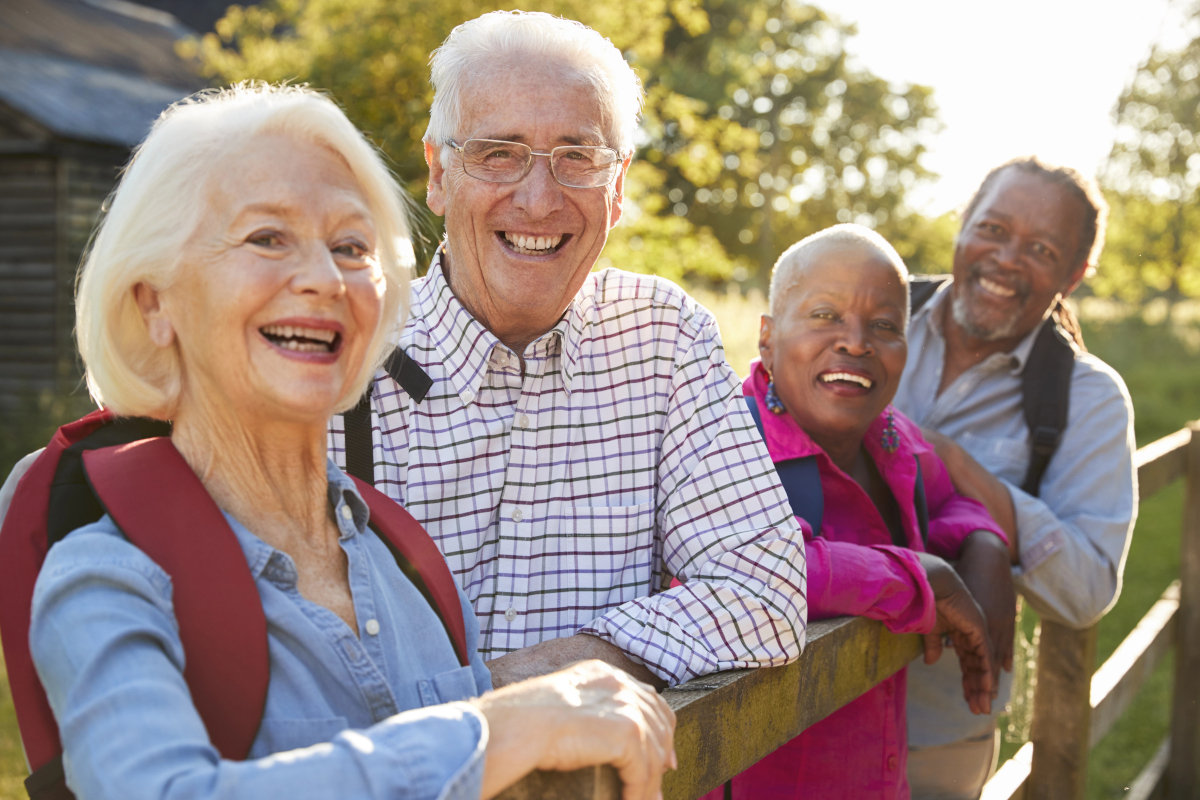This year is a great time for seniors to adopt a healthier lifestyle. People around the world are living longer. The mortality rate of older adults has decreased significantly over the past 30 years. This is primarily due to reductions in mortality rates for heart disease as well as a decline in deaths from almost all major diseases.
Life expectancy has increased for people over ages 65 and 85. More people in the U.S. are living long enough to become centenarians.
While medical advancements and better public health resources have helped give us more years, are we living those years well? More Americans are living longer but they aren’t necessarily living healthier.
Being healthy makes a difference in happiness and quality of life. People who are healthy tend to experience fewer aches and pains. Staying active and fit improves mobility and it’s great for mental wellness.
Older adults should find ways to stay active all year long, like these 7 safe outdoor spring activities for seniors. What else can you do to get a healthy start in 2024?
Cut Back on Unhealthy Foods
It’s easy to slip into the habit of eating unhealthy foods. They tend to taste good thanks to lots of salt and sugar. They are also often more convenient than cooking fresh meals from scratch. However, they can lead to health problems. Seniors should avoid eating:
- Fried foods
- Processed meats and foods
- Anything with added sugar
- High-salt foods
Many of these can increase your risk of heart disease and diabetes.
Drink Less Alcohol and More Water
An alcoholic drink can be a nice treat, but it shouldn’t be something enjoyed in excess. The Dietary Guidelines for Americans recommends that older adults limit their alcohol intake to one drink or less per day for women and two drinks or less per day for men.
The National Institute on Alcohol and Alcoholism recommends that adults over age 65 only drink seven drinks or fewer per week. That is for people who aren’t taking medications that might have interactions with alcohol.
As we age, our bodies handle alcohol differently than when we were younger. It takes longer to process because our livers produce less of the enzyme ADH.
Seniors are also at a higher risk for dehydration, especially in the warmer months. Make sure you get enough water. The Reynolds Institute on Aging recommends drinking between 6 and 8 glasses of fluid per day.
Schedule Your Screenings and Check-ups
Your medical care providers are your first line of defense when health problems appear. Make sure they can do their job by scheduling regular check-ups and screenings.
Detecting medical conditions early can make treatment easier, reduce the impact they have on your life, and give you the best chance at a positive outcome. Make sure you have the following screenings on your schedule:
- Blood pressure check
- Bone density test
- Cholesterol check
- Cancer screenings
Your doctor can advise you on which screenings are necessary based on medical history and risk.
Improve Your Strength and Balance
Exercise is good for your body. Seniors should be proactive about improving their strength and balance. Both have a direct impact on mobility and your risk of a fall injury. Those who already have limitations should find safe exercises that work for them. Seated workouts are a good place to start.
You can also check out these 10 changes senior citizens can make to lower their fall risk at home.
Physical activity is good for lung and heart health. It improves flexibility and coordination.
Find Healthy Ways to Manage Stress
Stress can cause mental and physical health problems. It should be managed carefully, especially as we deal with changes in life.
Seniors in particular face unique changes that can cause stress. The older we get, the more people we will see pass away. Older adults often face lifestyle changes, like needing more daily support or moving into an assisted living community. While these things may be good in the long run, it can be stressful to adapt.
Find a de-stressing routine that works for you. Common stress relievers for seniors include:
- Meditation and mindfulness
- Regular exercise and physical activity
- Hobbies like reading or gardening
- Keeping a personal journal
- Professional therapy
Get Quality Sleep Each Night
Sleep has a direct effect on all aspects of a person’s wellbeing. If you don’t get enough, your brain and body won’t be able to repair and rejuvenate. Rest allows us to restore our energy levels and regulate systems within our bodies.
The National Institute on Aging recommends adults over age 65 get 7 to 8 hours of sleep per night. Having a ritual to wind down before going to bed can help seniors fall asleep faster.
If You Smoke, Stop Now
It’s no secret that smoking is bad for you at any age. For seniors who already face elevated risks, it can make things even worse. People who smoke have a greater risk of developing or worsening conditions like lung disease, heart disease, diabetes, osteoporosis, and dementia. Smoking can also cause mental health problems like memory loss and depression.
It’s never too late to quit. Stopping now will lower your risk of long-term health conditions like COPD and cancer. It can also help slow the effects of aging.
There are other benefits for seniors who do not smoke:
- Medications are more effective
- Sense of smell and taste improves
- Lower risk of fire-related death
- Easier to perform daily activities
Stopping a habit isn’t easy. Your doctor can discuss options to help you stop smoking.
Keep Your Social Life Active
Socializing is essential for seniors. Isolation is a serious problem that can shorten lifespans and cause depression.
Older adults who build and maintain friendships tend to be more positive and happier. Being social also encourages seniors to be more active. Better physical and mental health will help increase longevity.
Assisted living communities provide opportunities for social interactions. They help prevent isolation and provide daily care. Older adults who are struggling with socializing, especially if they require more support, should consider joining a senior community.

